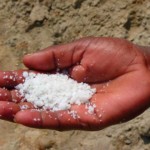
 Conventional wisdom: If you eat a lot of salt, you will get thirsty to dilute the sodium level in your blood. The excess salt will be excreted in your urine. But a new study of Russian cosmonauts is challenging this long-held belief. When the cosmonauts ate more salt, the became less thirsty. And their appetite increased – they had to eat 25 percent more to maintain their weight. From the New York Times : The crew members were increasing production of glucocorticoid hormones, which influence both metabolism and immune function. To get further insight, [Dr. Jens Titze, now a kidney specialist at Vanderbilt University Medical Center and the Interdisciplinary Center for Clinical Research in Erlangen, Germany] began a study of mice in the laboratory. Sure enough, the more salt he added to the animals’ diet, the less water they drank. And he saw why. The animals were getting water — but not by drinking it. The increased levels of glucocorticoid hormones broke down fat and muscle in their own bodies. This freed up water for the body to use. But that process requires energy, Dr. Titze also found, which is why the mice ate 25 percent more food on a high-salt diet. The hormones also may be a cause of the strange long-term fluctuations in urine volume. Scientists knew that a starving body will burn its own fat and muscle for sustenance. But the realization that something similar happens on a salty diet has come as a revelation. https://youtu.be/aJEzl31zL-I
Conventional wisdom: If you eat a lot of salt, you will get thirsty to dilute the sodium level in your blood. The excess salt will be excreted in your urine. But a new study of Russian cosmonauts is challenging this long-held belief. When the cosmonauts ate more salt, the became less thirsty. And their appetite increased – they had to eat 25 percent more to maintain their weight. From the New York Times : The crew members were increasing production of glucocorticoid hormones, which influence both metabolism and immune function. To get further insight, [Dr. Jens Titze, now a kidney specialist at Vanderbilt University Medical Center and the Interdisciplinary Center for Clinical Research in Erlangen, Germany] began a study of mice in the laboratory. Sure enough, the more salt he added to the animals’ diet, the less water they drank. And he saw why. The animals were getting water — but not by drinking it. The increased levels of glucocorticoid hormones broke down fat and muscle in their own bodies. This freed up water for the body to use. But that process requires energy, Dr. Titze also found, which is why the mice ate 25 percent more food on a high-salt diet. The hormones also may be a cause of the strange long-term fluctuations in urine volume. Scientists knew that a starving body will burn its own fat and muscle for sustenance. But the realization that something similar happens on a salty diet has come as a revelation. https://youtu.be/aJEzl31zL-I
More here:
Scientists stunned by new findings about salt’s effects on body
